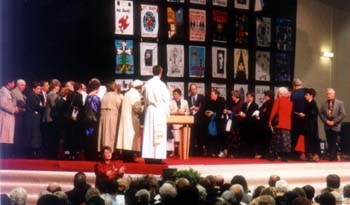Liturgical Abuse of the Week Returns!

Once again, courtesy of Redemptionis Sacramentum.
This is one of my least favorite abuses, but perhaps the most common of those addressed by RS. Let's look at the text, then some commentary:
First, off, the name "minister of the Eucharist," and the office of administering Holy Communion, belong properly to bishops, priests, and deacons, who are the 'ordinary' ministers of communion (RS 154). The 'extraordinary' minister of Holy Communion is the formally instituted acolyte (RS 155). However, if "reasons of real necessity" prompt it, another layperson may be delegated, but this is to be done by the diocesan Bishop. Only, then, in "special cases of an unforeseen nature" can permission be given by the presiding priest (RS 156).
The following sections are worth quoting in full:
This function is to be understood strictly according to the name by which it is known, that is to say, that of extraordinary minister of Holy Communion, and not "special minister of Holy Communion" nor "extraordinary minister of the Eucharist" nor "special minister of the Eucharist," by which names the meaning of this function is unnecessarily and improperly broadened (Ibid.).
If there is usually present a sufficient number of sacred ministers for the distribution of Holy Communion, extraordinary ministers of Holy Communion may not be appointed. Indeed, in such circumstances, those who may have already been appointed to this ministry should not exercise it. The practice of those Priests is reprobated who, even though present at the celebration, abstain from distributing Communion and hand this function over to laypersons (RS 157).
Indeed, the extraordinary minister of Holy Communion may administer Communion only when the Priest and Deacon are lacking, when the Priest is prevented by weakness or advanced age or some other genuine reason, or when the number of faithful coming to Communion is so great that the very celebration of Mass would be unduly prolonged. This, however, is to be understood in such a way that a brief prolongation, considering the circumstances and culture of the place, is not at all a sufficient reason (RS 158).
Now, why is this so essential? Is this just a nit-picky slap on the wrist of sincere laypersons who only want a chance to participate more fully in a liturgical service?
It is true that the widespread and habitual use of monstrous numbers of extraordinary ministers of Holy Communion (EMHC) tends to blur the line between the ordained and the lay faithful, as do countless other abuses in the modern Church. But this is only half the story. Our goal should not be to create an unbridgeable chasm between the ordained and the lay faithful, and thus to eliminate all that the two vocations might have in common, which, besides beginning the inevitable descent to clericalism, also has the effect of eroding the ministry of both parties. Rather, the goal should be to cast light upon exactly what defines the roles and ministries of each vocation vis-a-vis the other. There are some ministries which both will share in common, due to the common baptismal vocation shared between them (e.g., the call to a life of self-giving charity); others are exclusive (e.g., representing Christ the High Priest in the liturgy); it is when these exclusive roles are obscured that the ministries themselves are rendered ineffective.
Thus, it is the role of the priest, precisely in the Eucharistic celebration, to function in persona Christi, to represent Christ the High Priest who sanctifies, teaches, and governs His people in the context of the Paschal Sacrifice. St. Augustine pointed this out most clearly in response to the Donatist challenge. When the ordained minister baptizes, it is Christ Himself who baptizes. When the ordained minister anoints, it is Christ Himself who anoints. And when the ordained minister gives to us the consecrated elements, it is Christ Himself who gives to us His Body and His Blood. To introduce a myriad of other persons, who do not and cannot share this role, obscures and diminishes the priest's ministry. It is not that Christ cannot act through the lay faithful in the liturgy, it is that the faithful are incapable, by the nature of their very status, of being 'acted through' in precisely this way. To be a bit earthy, when an army of middle-aged, overweight housewives assault the altar every Sunday like the beaches of Normandy, nearly bowling over the priest in the process, the faithful are prevented from witnessing the presence of Christ in the person of the minister. Like the lame man at the pool of Bethesda, the faithful are so eager to leap into the midst of the hubbub, to heal their loneliness by relentless activism, they miss the opportunity to contemplate the the very person of Jesus Christ who stands in their midst waiting to heal their wounds.
# posted by Jamie : 3:37 PM
|
|

